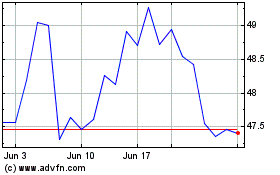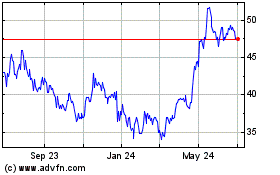By Katy Stech Ferek and John D. McKinnon
The Trump administration said it will ban downloads of the
Chinese-owned video-sharing app TikTok and U.S. downloads and
support of WeChat, China's popular messaging and electronic payment
app, after Sunday night over national-security and data-privacy
concerns.
Commerce Department officials on Friday released a series of
prohibited transactions for both of the apps, which have tens of
millions of U.S. users. Under the rules set forth in two separate
orders, U.S.-based individuals will not be able to download or
update either app through Google's and Apple's app stores after
midnight on Sunday.
In a key concession, Commerce officials said U.S. companies, for
now, would be allowed to continue using WeChat in China, where many
firms use the app for payments from customers.
The Commerce Department said it would order a full ban for
TikTok by Nov. 12 but noted that discussions for a deal that would
incorporate data safeguards could enable U.S. users continued
access of TikTok.
As of Sunday, TikTok users in the U.S. will be blocked from
maintenance and upgrades, according to a Commerce release. The
rules enable continued usage of TikTok until Nov. 12.
Would-be WeChat users will be hit harder. Downloads of the app
will be prohibited after Sunday in the U.S. And U.S. support for
the app -- through internet traffic services such as data hosting
and content caching -- will be prohibited at the same time.
The net effect will be to seriously degrade its functionality
for users in the U.S., senior Commerce officials said. Users will
experience slow speeds to the point of timing out, so while the
service might still be technically usable, it won't be very
functional after Sunday night, officials said.
While U.S. companies would be allowed to continue using WeChat
outside of the country, the Commerce announcement notes that the
agency could prohibit overseas use of WeChat by Americans in the
future. It also could move against other online services offered by
WeChat parent Tencent Holdings Ltd. such as its gaming platforms,
according to the Commerce announcement.
Tencent didn't immediately respond to requests for comment on
the new rules. WeChat has 19 million daily active users in the
U.S., according to data provider Apptopia.
A TikTok spokesman called the Commerce rules disappointing,
saying: "We've already committed to unprecedented levels of
additional transparency and accountability well beyond what other
apps are willing to do, including third-party audits, verification
of code security, and U.S. government oversight of US data
security."
In a call with reporters on Friday, a senior Commerce official
declined to explain how the new rules would be enforced or whether
it would impose monetary penalties for violations.
Commerce officials said the Chinese-owned apps pose similar
threats to Americans.
"Each collects vast swaths of data from users, including network
activity, location data, and browsing and search histories," the
Commerce Department said. "Each is an active participant in China's
civil-military fusion and is subject to mandatory cooperation with
the intelligence services of the [Chinese Communist Party]."
Commerce Secretary Wilbur Ross said on Fox Business Network on
Friday morning that he made the decision on the rules after
President Trump ordered his department to review WeChat for
national-security concerns last month.
"China has been taking all kinds of data...that's what we're
trying to squelch," he said.
As of Sunday, Commerce said it will block "any provision of
service to distribute or maintain the WeChat or TikTok mobile
applications, constituent code, or application updates through an
online mobile application store in the U.S." It will also block any
money transfers through the WeChat app for U.S.-based users.
Commerce officials delayed prohibition of transactions that
would greatly impair TikTok's user experience until Nov. 12,
matching the 90-day deadline that President Trump set for the
divestiture of TikTok's U.S. operations. In that order, Mr. Trump
said that TikTok parent company, Beijing-based ByteDance Ltd.,
"might take action that threatens to impair the national security
of the United States."
TikTok officials said the app surpassed two billion global
downloads last month and has roughly 50 million daily active users
in the U.S. The Trump administration contends that the data TikTok
collects from U.S. consumers could be shared with the Chinese
government. TikTok has said it would never hand over such data.
TikTok is hugely popular among young people, and Friday's move
could affect the quality of the app that has become a fixture on
the smartphones of millions of American teenagers. It also ratchets
up the pressure on ByteDance to reach a deal with the U.S.
government. A Commerce official denied that the decision to
postpone a TikTok shutdown until after the November election was
influenced by political concerns.
ByteDance has been locked in negotiations over how to address
the U.S. government's security concerns, and this week seemed to be
gaining momentum toward an agreement that could be signed by
President Trump. A consortium of U.S. companies, led by Oracle
Corp., are discussing a plan to take a majority stake in a new
company that would oversee TikTok's operations and ensure its data
security.
People involved with the negotiation talks have said multiple
times throughout the week that an agreement appeared imminent, even
while key issues were still being ironed out. But the announcement
on Friday indicates there may be further distance between the two
sides than previously understood.
A senior Commerce official said Friday that as the TikTok deal
moves forward, Mr. Ross is prepared to "change or even potentially
remove the restrictions [on TikTok] if the President agrees to a
deal."
On Thursday, a federal judge heard arguments from WeChat users
who sued to block Mr. Trump's executive orders in August that
sought to impose limits on the app but didn't immediately issue a
ruling
In a filing on that case Wednesday, Justice Department lawyers
said the government wouldn't pursue legal action against
individuals who use WeChat "to convey personal or business
information between users," a clarification plaintiffs said still
didn't make clear which specific activities would be barred.
WeChat bundles social media, text messages, mobile payments,
corporate marketing and other functions into one app. While
WeChat's users are primarily in China, the app is important among
the Chinese diaspora in the U.S. and is widely used by foreigners
with professional or personal ties in China.
WeChat and its domestic sister app Weixin have about 1.21
billion monthly active users combined. On an earnings call in
August, Tencent executives sought to distinguish the two apps and
allay investors' fears. The company generates less than 2% of
revenue from the U.S., a Tencent executive said at the time.
American brands from Walt Disney Co. to Walmart Inc. rely on
WeChat to reach and collect payments from customers in China. Nine
out of 10 companies surveyed by the American Chamber of Commerce in
Shanghai said the ban would hurt their Chinese operations, should
the ban extend to China.
Launched by Tencent in 2011, WeChat has become the go-to example
of China's capacity to innovate. In addition to running the world's
most-used social media app, Tencent is the world's biggest
videogame company by revenue. In the U.S., Tencent owns Riot Games
Inc., creator of the popular videogame "League of Legends," and has
stakes in "World of Warcraft" maker Activision Blizzard Inc. and
Epic Games Inc., developer of the popular game "Fortnite."
After Mr. Trump's August executive orders, Tencent hired Edward
Royce, former chairman of the House Foreign Affairs Committee, and
four other lobbyists from Brownstein Hyatt Farber Schreck LLP,
according to a disclosure filing.
With a market value of more than $645 billion, Hong Kong-listed
Tencent is one of the biggest companies in China and works closely
with the government. Chairman and Chief Executive Pony Ma has been
a member of the rubber-stamp National People's Congress since
2013.
Jing Yang and Georgia Wells contributed to this article.
Write to Katy Stech Ferek at katherine.stech@wsj.com and John D.
McKinnon at john.mckinnon@wsj.com
(END) Dow Jones Newswires
September 18, 2020 11:33 ET (15:33 GMT)
Copyright (c) 2020 Dow Jones & Company, Inc.
Tencent (PK) (USOTC:TCEHY)
Historical Stock Chart
From Mar 2024 to Apr 2024

Tencent (PK) (USOTC:TCEHY)
Historical Stock Chart
From Apr 2023 to Apr 2024
